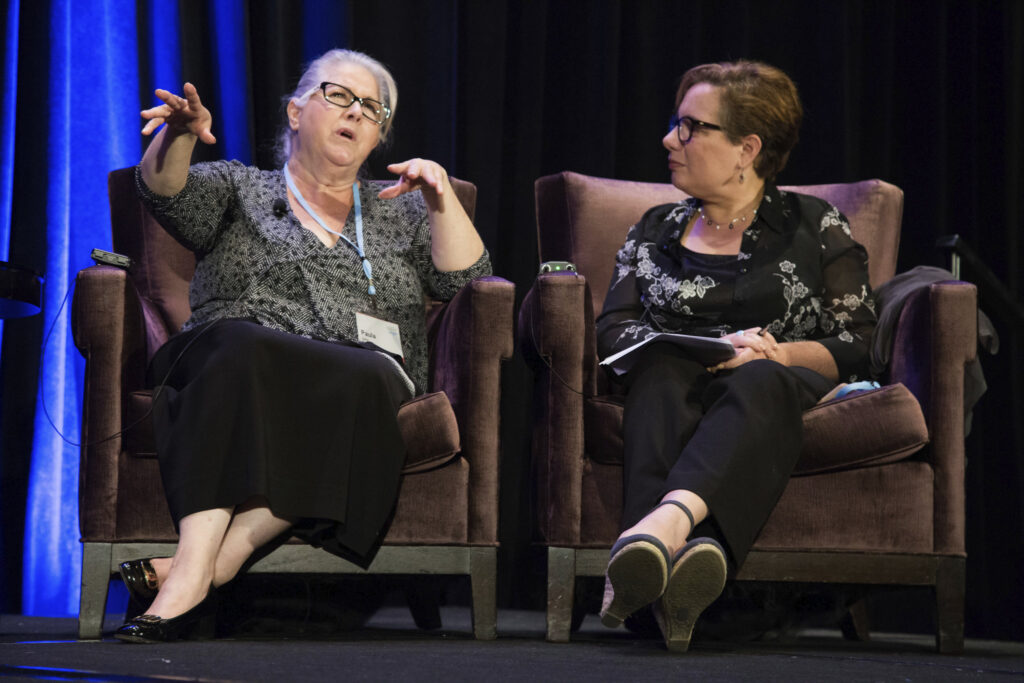“When they hear my voice, it’s power,” declared Paula Jones, a participant at ECHOS, a Houston-based health, social, and educational resource organization.
Paula was talking about the power of feedback during a plenary session at the 2018 Shared Insight Gathering in Houston, attended by nearly 400 nonprofit and foundation leaders. On an English- and Spanish-speaking panel of ECHOS staff members and participants, Paula described what it was like to be asked her opinions about the organization’s services — and what it meant to her to see real changes made based on her feedback.

Paula’s story added authenticity and urgency to the shared belief of so many of us in the room that day, which is at the core of our work at Fund for Shared Insight: that listening to the people we seek to help is the right and smart thing to do. We know it’s right to elevate the voices least heard in our society, treating people with lived experiences accessing nonprofit programs and services with dignity, respect, and as partners in the work of the social sector. We also know it’s smart to include the voices of people who are the experts on their own lives to inform how programs and services are delivered and how they can be improved.
But as we see and hear more evidence every day from people like Paula, we are coming to know that feedback loops are not only the right and smart thing to do, but an empowering thing to do as well.
More than 200 customer-facing nonprofit feedback partners are participating in Shared Insight’s signature initiative, Listen for Good (L4G). Since 2016, L4G has supported organizations in building the practice of listening to the people they seek to help by implementing a five-step feedback process designed to ensure high-quality feedback loops that lead to meaningful change. To gather this feedback, L4G nonprofit partners employ a semi-standard survey instrument on SurveyMonkey, which includes using a customer-feedback tool called the Net Promoter System, as a simple, systematic way of listening to the people at the heart of their work. To date, our nonprofit partners across the country have received more than 90,000 survey responses from their respective programs’ participants.
Our evaluation partner, ORS Impact, has been assessing the effectiveness of the L4G initiative since it began in 2016. In ORS’s newly released evaluation of our 2016 and 2017 L4G grantees (112 organizations), we learned that:
- Organizations saw statistically significant rates of improvement in their ability to implement feedback loops (defined as systematically listening to the people they seek to help and acting on what they hear).
- Nearly half of program managers report at 24 months having gained insights about issues such as clients’ needs and satisfaction, which provide a balanced mix of new information and confirmation of prior beliefs.
- Nearly eight out of 10 organizations are translating insights from feedback into changes to better serve clients. Among those:
- Sixty-three percent are making changes to program offerings;
- Forty-five percent are making changes to operations;
- Thirty-seven percent are making changes to staff-client interactions; and
- Thirty-one percent are offering new services.
- There is growing evidence that L4G advances organizations’ equity, diversity, and inclusion work by providing clients a seat at the table at various stages of the decision-making process and allowing them to shape the services that benefit their communities.
Shared Insight is especially proud of that last finding, and we’re heartened to see it reflected in the informal feedback we are receiving from staff members and clients at L4G-participating organizations.
For example, Chris Ramsey, a lead case manager at Our House, a multi-service nonprofit in Little Rock, Arkansas, described how transformative simply surveying clients can be. “When you’re in poverty,” he said, “it’s the voice that gets lost. And that might be the most devastating part about it, beyond not having opportunity. It’s that you can’t be heard.”
Sharonica Lee, a client at Our House, recounted her experience giving feedback through L4G: “It feels pretty good to know they want our input to make it better. I was like, ‘Yes!’ I remember putting that down on paper, and they’re going to do that. That’s great, they’re listening!”
We love the enthusiasm and positivity that high-quality feedback loops can generate among participants, and we are also watching closely for the different ways feedback can foster empowerment. Here’s what other L4G participants are telling us:
Clients are being valued and heard as advocates for themselves. Troy Allen, director of community employment services at SRVS in Memphis, Tennessee, explained what happened when he asked Henry, an individual with intellectual disabilities, to participate in the L4G survey: “Henry said, ‘Don’t you want to interview my sister? She’s my caretaker and always answers my questions.’ When I told Henry we wanted to hear directly from him, he gave us the biggest smile, and went on to share all kinds of things about his wants and desires that we and his sister never knew.”
Clients are partnering with nonprofits in real time to make changes that will increase the likelihood of success for themselves and others. Dominick Dudley, a corps member at Conservation Corps North Bay in San Rafael, California, spoke about how he recommended that CCNB offer internships in specific fields and invest in supervisor training for work crews to improve safety, morale, and professional development for corps members. He was amazed when he saw his suggestions implemented, and he participated in the first internship cohort at CCNB, where he learned how to become an environmental educator in K-12 classrooms. “CCNB showed it values my opinion and believes in me,” Dominick said. “Now I want to let other young people know that I believe in them and they have value.”
Traditional power structures within nonprofits are undergoing change. Tess Reynolds, CEO of New Door Ventures in San Francisco, California, described how feedback loops are transforming dynamics throughout the organization — not just among the young people the group serves, but among its staff and board members, too. “Our board felt more connected to the youth through the feedback and had greater confidence that we were offering services the youth found truly helpful,” Tess said. “The staff also felt empowered to make decisions to improve our programs because we had the feedback data from the young people — and we were able to make those changes in partnership with a council of alumni we recently created as a sounding board.”
So what Tess and other grantees are telling us — and the evaluation data are showing us — is that feedback can give voice and agency to people traditionally denied those things, and that, in turn, can improve services and change power dynamics.
Thanks, Paula, for reminding us from the stage at the Shared Insight Gathering that creating high-quality feedback loops is the right, smart, and empowering thing to do. We hear you.
Melinda Tuan is managing director of Fund for Shared Insight. Follow her on Twitter at @MelindaTuan.


